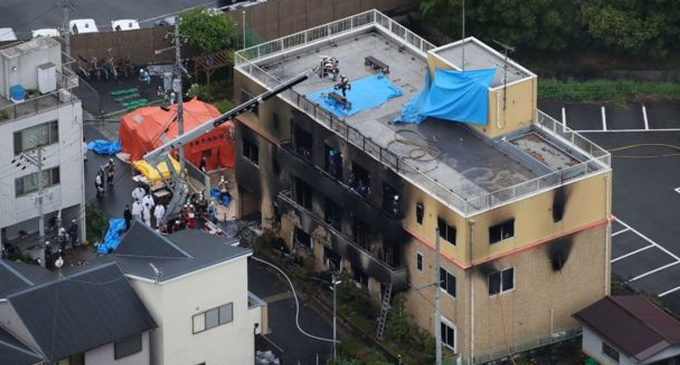(FASTNEWS|COLOMBO) – At least 33 people died and dozens were injured after a man set fire to an animation studio in the Japanese city of Kyoto, officials say.
Police said the 41-year-old suspect broke into the Kyoto Animation studio on Thursday morning and sprayed petrol before igniting it.
The suspect has been detained and was taken to hospital with injuries.
Japan’s Prime Minister Shinzo Abe said the incident was “too appalling for words” and offered condolences.
It is one of Japan’s worst mass casualty incidents since World War Two.
Kyoto Animation, known as KyoAni, produces films and graphic novels, and is well regarded by fans for the quality of its productions.
Who is the suspect?
Reports say the man is not a former employee – but eyewitnesses say he appeared to be angry with the animation studio.
They said he ran away from the building towards a nearby train station after the fire started but fell to the ground. Some reports said he was pursued by employees of Kyoto Animation.
The Asahi Shimbun newspaper quoted a 61-year-old neighbour as saying she clearly heard the man shout: “You ripped me off.”
The suspect was injured and was being treated in hospital, so police could not immediately question him.
What do we know about the studio?
Kyoto Animation, known as KyoAni, was founded in 1981 and has produced popular animation shows including K-On and The Melancholy of Haruhi Suzumiya.
The studio also released a standalone feature anime A Silent Voice in 2016.
One of KyoAni’s series, Violet Evergarden, was picked up by Netflix for a global market.
It also publishes many popular graphic novels, mainly about teenage school life.
The studio is known for paying its animators a regular salary, breaking with the industry’s standard of paying per frame – which is seen as putting extreme pressure on staff.
It is also the first successful studio outside Tokyo, Prof Ryusuke Hikawa from Meiji University told NHK. (Foreign Media Reports)



